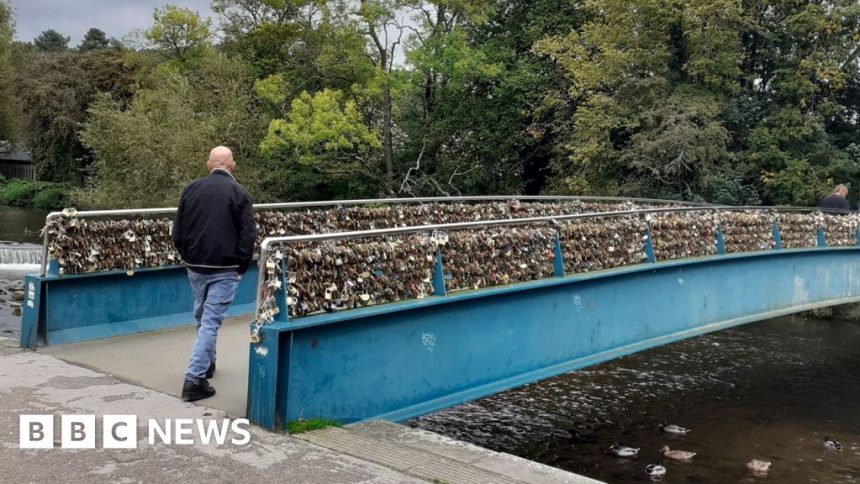Should landmark love lock bridge be preserved?
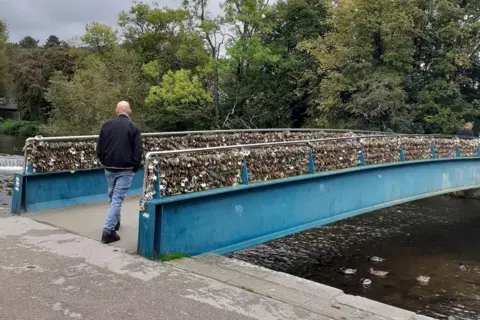 Sara Allen
Sara AllenThousands of love locks are to be removed from a landmark bridge in the Peak District, despite a campaign to save them. Are they a dangerous eyesore, or is the lock-laden bridge a monument worth preserving?
Jamie Allen knew he didn’t have long to live when he attached a love lock to Weir Bridge in the picturesque town of Bakewell.
His new wife, Sara, stood beside him but was too upset to help him attach it.
She had given him the lock on their wedding day only a week before.
“It was quite emotional for him knowing that I would be going back on my own or with his family,” says Sara.
They had been together for eight years when Jamie was diagnosed with pancreatic cancer in July 2023.
They decided to marry on 27 September, and he died three months later to the day, aged 52.
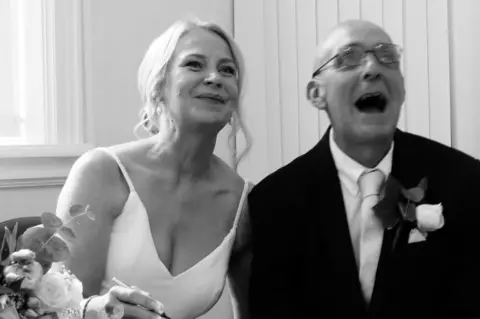 Sara Allen
Sara AllenSara now visits the bridge every two weeks and was due to visit with some of his relatives on their wedding anniversary.
But Derbyshire County Council is due to remove all of the locks for maintenance of the bridge before that can happen, melt them down, then change the railings to stop more being attached in future.
The decision has saddened Sara, who says visiting the bridge brings her “peace”.
“I can’t even explain it,” she says. “It’s just knowing that James [the name she called him] put it on.
“He was the love of my life, I’d waited so long to meet someone special like him.”
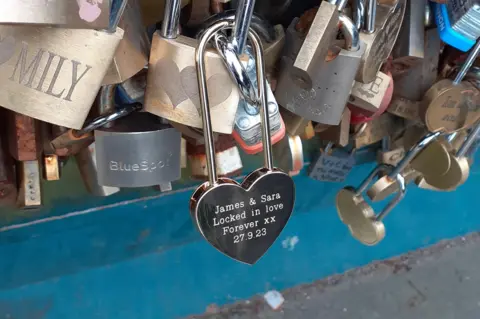 Sara Allen
Sara AllenHundreds, if not thousands, of other people have stories similar to Sara’s.
The footbridge was built over the River Wye about 25 years ago, but locks first appeared in 2012.
Mike Hall placed a lock there with his wife Carol back in 2014.
At that point, they had been married for 32 years, but Mike says they were “in love as much then as we were when we first met as childhood sweethearts”.
As the years passed, they lost sight of their padlock as the global trend for love locks spread and thousands of other locks appeared on the bridge.
Soon, the railings of the bridge were so crammed that new locks could only be attached by fastening them to the existing ones.
Mike recalls trying to find theirs every time they walked over the bridge, while Carol patiently waited.
 Mike Hall
Mike HallThey never found it again, and Carol died from cancer on 28 September 2020.
But to his astonishment, Mike then managed to find the lock when he completed a 1,000-mile walk on their 39th wedding anniversary – their first since she died, and seven years after they first placed the lock together.
“I was in tears on the bridge and was comforted by some young people that heard me shout out ‘I’ve found it’,” he said.
“They didn’t have to stop, they didn’t have to show concern, but they did and they helped me photograph it, so they are part of my story now.
“Was it fate that I found the padlock on our anniversary, our first apart, was it destiny or was it her on the other side?”
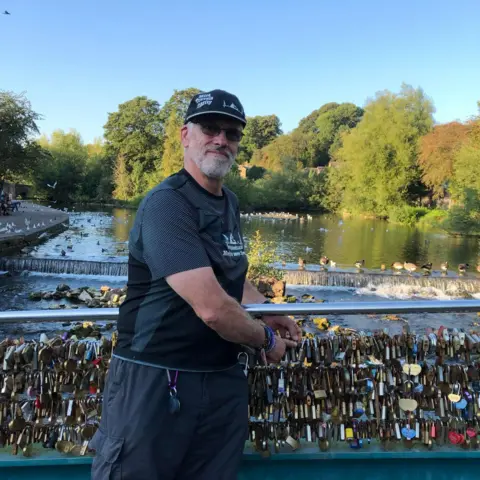 Mike Hall
Mike HallFor Mike, the bridge isn’t just a bridge.
“It’s a living memorial of happy times and many other noteworthy events, and that’s why it’s so important to preserve this monument,” he says.
Mike feels so strongly about the locks being removed, that he has written to the council asking for them to be moved somewhere else to create a memorial.
“We all know that something needs to be done and the council are in a difficult position trying to appease everyone,” he says.
“A bridge is supposed to bring people together, not divide, but that seems to be what’s happened.
“All we want to do is work with the council and residents to find a place that suits all, especially all that have an emotional connection with the locks, bridge and Bakewell.”
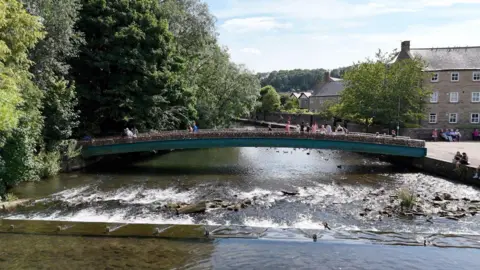
This is something a campaign group called Save the Love Locks at Bakewell has also been asking the council to do, but it appears to be a bridge too far.
“We have in the past spoken to other organisations – because we don’t own any of the suitable surrounding land – about other potentials for the locks, but that sadly hasn’t come forward,” says Councillor Charlotte Cupit, who is cabinet member for highways assets and transport.
The campaign group has queried why the locks can’t be put back on the bridge after the maintenance work.
Miss Cupit previously claimed that keeping the bridge lock-free will “improve public safety” because of the risk of “grazes and cuts from protruding locks”.
“We’ve had complaints about it in the past and people obviously raising concerns about cuts and grazes, so it is something we have to factor in,” she says.
The BBC asked the council’s press office how many complaints had been made over the years, and it said “we have received the occasional email”.
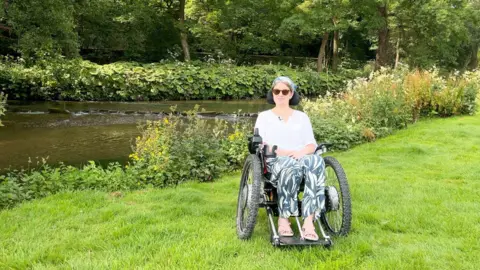
As well as public safety, the large numbers of padlocks have sparked concerns over accessibility.
It sometimes gets so busy that Bakewell resident Claire Wilson finds it difficult to cross in her wheelchair.
“So many people just stop to look at all the locks, and nobody ever looks behind them,” she says.
“So as an electric wheelchair user, my chair doesn’t stop instantly, so I’ve had quite a few near-misses.”
On top of this, Claire believes the locks look horrible.
“I’ve always detested them,” she says. “I find it an eyesore. It looks disgusting I think. It’s Bakewell, not Paris.”
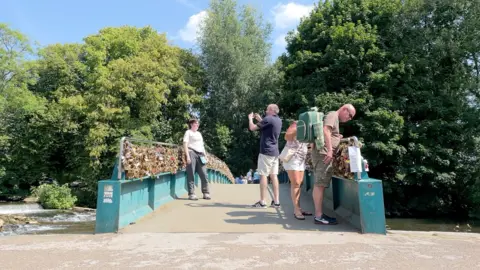
Claire isn’t alone in her views of the love locks. When their removal was confirmed – following a previous reprieve – some people were joyous.
“Excellent – been an eyesore for years, get all that scrap weighed in,” said Paul Wilson on the council’s Facebook post.
“I don’t get why people like it,” said Chloë Harwood under the same post. “You can bet the people who put the locks on never give them a second thought.”
Alison Evans added: “They’ll have put one on, thrown the key in the river and forgotten about it.
“Hope they’re going to go round every week with bolt cutters to stop it happening again.”

Bakewell town councillor Paul Morgans acknowledges that the locks divide opinion.
“I mean, it is a bit Marmite here in town where people say it’s an eyesore, but I do think a lot of towns would give their eye-teeth to have something like this and bring in that amount of tourists,” he says.
He believes the locks contribute a lot to the local economy, because people visit repeatedly to see their locks after placing them on the bridge.
“It’s got a lot of sentiment, there’s an awful lot of love on that bridge,” he says.
“Some of the messages on them are quite tear-jerking actually. There’s some where somebody has lost their child very young, there’s one that’s a stillborn child, so it’s quite emotional.”
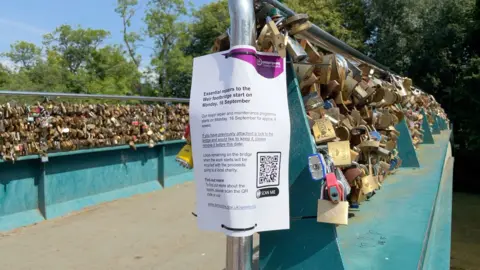
So can a bridge be built between those who detest the love locks, and those who want them to stay in Bakewell?
Richard Young, founder of the Save the Love Locks at Bakewell campaign, says he is not giving up.
Since the council announced the date for the love locks to be removed and melted down, his Facebook page has been inundated with posts.
“Reading some of these posts, even I have underestimated the emotion,” he says.
“The council have only got to read the posts and comments on the Facebook group to see which way they need to go. Melting them down is certainly not the way.”
Richard believes he has identified alternative places in Bakewell where the love locks can be moved, and says he is speaking to the council about this.
“My hope is for the council to continue the love lock tradition in Bakewell,” he says.
“I’m sure there’s something we can do. So we’re not beat yet.”
Follow BBC Derby on Facebook, on X, or on Instagram. Send your story ideas to eastmidsnews@bbc.co.uk or via WhatsApp on 0808 100 2210.



